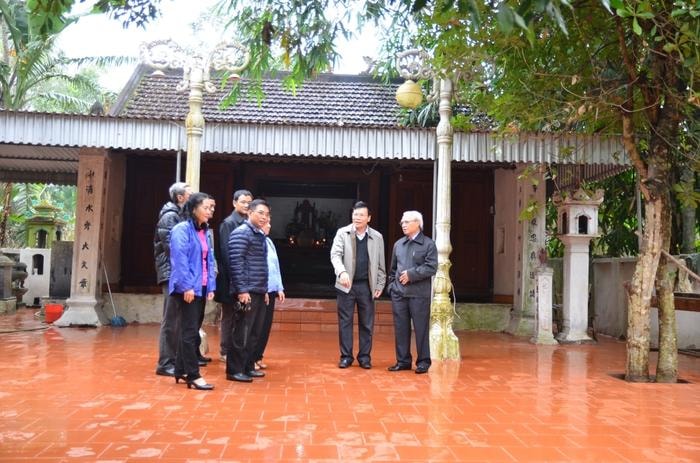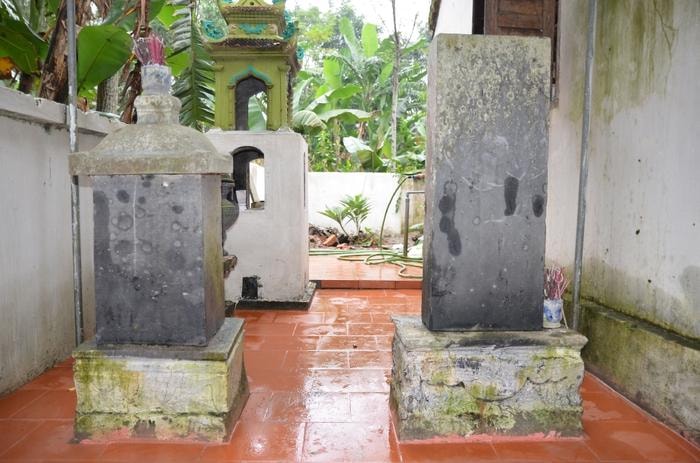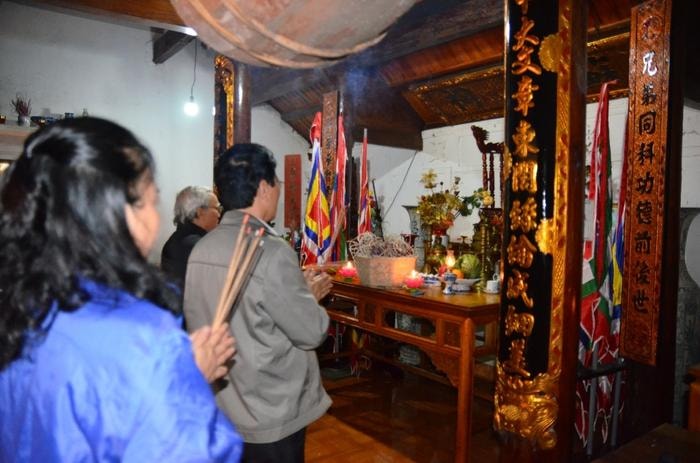The famous land of Trung Can and the tradition of the Nguyen Huu family
(Baonghean) - In Nam Dan(Nghe An)The Nguyen Huu family in Nam Trung commune has a history of nearly 500 years with 17 generations and 5 branches of descendants who have always continued the tradition of studiousness and academic achievement, contributing to the development of their homeland and country.
From the tradition of the homeland...
Located on the banks of the Lam River, the ancient land of Nam Trung (from the 16th century) was called Trang Can Cung, belonging to Nam Hoa Thuong commune, Nam Hoa canton, Thanh Chuong district. At the beginning of the 19th century, Trang Can Cung was separated from Nam Hoa Thuong commune to become Trung Can commune and still belonged to Nam Hoa canton, Thanh Chuong district. At the end of the 19th century, Nam Hoa canton was changed to Nam Kim canton, Trung Can commune still belonged to Nam Kim canton, Thanh Chuong district. In 1910, Nam Kim canton was transferred to Nam Dan district.
After the August Revolution of 1945, the two communes of Trung Can and Duong Lieu were merged into today's Nam Trung commune.
 |
| Nguyen Huu family branch II temple (Nam Trung commune, Nam Dan). |
This land has always circulated the saying "Quan Trung Can, people of Duong Lieu" meaning that people of Trung Can village have a tradition of learning, people of Duong Lieu village have the will to "resist the temptation", continued by the spirit of patriotism to rise up and fight with the Party later. According to the book "Nghe An Royal Examinations - (1075 - 1919)" compiled by author Dao Tam Tinh, Nghe An has 2 villages famous for the number of people with high royal examinations, which are Quynh Doi village (Quynh Luu district) accounting for 17% of the total number of royal examinations in Nghe An and Trung Can village (Nam Dan district) accounting for 11%. According to historical documents, from the 17th century to the beginning of the 20th century in Trung Can commune, there were 8 people who passed the royal examinations and 16 people who passed the middle examinations.
Doctor Tong Tat Thang is considered the founder of Trung Can region under the Le dynasty, serving as an official to the position of Minister of Personnel and Grand Scholar of Dong Cac; was awarded the title of Nghia Quan Cong, and made many glorious achievements to protect the border and preserve the territory of the country and homeland.
Trung Can is also the homeland of outstanding sons of the nation such as Trung Quan Cong Nguyen Nhan My, who contributed to the restoration of the Le Trung Hung dynasty; Tam the ngu hoang hoa Thuong Thuong (passed the doctoral exam in the year of Nham Thin - 1712)... This is also the homeland of comrade Nguyen Tiem, the first Secretary of Nghe An Provincial Party Committee (died at the age of 21, while serving as a member of the Central Party Committee in charge of propaganda work); the homeland of the late Minister Tran Quoc Hoan - the first Minister of Public Security of Vietnam, along with many civil and military mandarins, past and present, many sons who have gone on to achieve success in many fields, bringing glory to their homeland.
The tradition of the homeland has been giving strength to the cadres and people in the homeland today to have a strong will to rise up, becoming one of the first communes in Nam Dan to meet the new rural standards. This is the result that most comprehensively reflects the change of the homeland with rich revolutionary tradition.
 |
| Two stone steles preserved for hundreds of years are still intact. |
…. to family tradition
The Nguyen Huu family (Nam Trung commune) originated from Thuong Trung commune, Vinh Tuong district, Vinh Phuc province today. In the 16th century, Mr. Nguyen Huu Nhuan Oc migrated to Trang Can Cung (now Nam Trung commune) to settle down and became the ancestor of the Nguyen Huu family here.
Going back in history, the Nguyen Huu family has always produced excellent children who achieved high grades and contributed a lot to the people and the country. In the Han Studies period alone, there were 3 major examinations; in the secondary examinations, there were 12 Bachelors and 21 Bachelors. For the Nguyen Huu branch II, there was the Censor Nguyen Trong Duc (the first ancestor of the branch II) and the Imperial Censor Nguyen Huu Lap...
According to the book of Nghe An Royal Examination and the genealogy of the Nguyen Huu family, Nguyen Trong Duc was born in 1799. He took part in the provincial examination and passed the Bachelor's degree at the age of 26. He was appointed as District Chief, then promoted to District Chief, and then promoted to Inspector General. Later, he was successively awarded the title of Han Lam Vien Thi Giang, then Han Lam Vien Thi Doc. In addition to being a high-ranking mandarin of the court, he was also a scholar of Nghe An and a doctor of oriental medicine. He died in the year of Mau Ngo (1858) and in the year of Dinh Mao (1867), his son Nguyen Huu Lap built a church and erected a stone stele as a place of worship and commemoration, which became the church of the second branch of the family today.
Speaking of the Song Nguyen Hoang Giap Nguyen Huu Lap, he is the second generation descendant of branch II. His father is the Censor Nguyen Trong Duc, his mother is Mrs. Phan Thi Hoa. He was born in the year of Giap Than (1824); at the age of 14, he passed the Bachelor's exam, at the age of 26, he passed the Giai Nguyen exam in the Canh Tuat era under King Tu Duc; at the age of 39, he passed the Hoi exam and won third place, then the Dinh exam and won second place in the Doctorate exam, first place, that is, Dinh Nguyen Hoang Giap. Because he passed both Giai Nguyen and Dinh Nguyen (ie, valedictorian twice), he is also called the Song Nguyen Hoang Giap.
 |
| Descendants of Nguyen Huu family burn incense to commemorate their ancestors. |
After passing the Imperial examination, Nguyen Huu Lap was successively assigned to many official positions and he always used integrity to discipline himself, used fairness to handle matters, dared to frankly advise the king, so he was praised by King Tu Duc and awarded a golden plaque engraved with the four words "Liem, Binh, Cong, Can" (integrity, equality, fairness, diligence) and many other valuable items.
In the year of Giap Tuat (1874), the 27th year of Tu Duc's reign, due to his many contributions, Nguyen Huu Lap was awarded by the king with a stone inkstone, silver, money, and a banner embroidered with the four words "Trieu dan lai chi" (the people are relied upon), and was also awarded 10 royal poems, which the king commented "Hoc trang tam phuong" (outstanding intelligence); then he was appointed to hold the position of Tham bien Co mat sa, Thuong bac su vu in communication with foreigners, promoted to Huu Tham tri Bo Binh, and concurrently Co tham vien dai than (the Privy Council has 4 civil and military mandarins from the third rank and above, concurrently in charge of discussing important matters and assisting in military affairs).
Promoting the tradition of the Nguyen Huu family's academic tradition, the descendants of branch II always strive to study, work creatively and achieve many high achievements in the fields of science and technology, economics, education, medicine, law, and the army. Branch II has 1 professor; 20 doctors; more than 50 masters and many bachelors, engineers, doctors, and senior officials at home and abroad, such as Permanent Deputy Minister of Education Nguyen Huu Dung; Dr. Nguyen Huu Khang - Chief Justice of the Administrative Court of Marseille City (France); veteran revolutionary - Colonel Nguyen Huu Dang; Mr. Nguyen Le Kiem - Vice Chairman of the People's Committee of Thua Thien Hue Province; Professor, Dr. Nguyen Huu Khoi - Vice Chairman of the Vietnam Otorhinolaryngology Association; Mr. Nguyen Van Kich - Head of Department, Advisor to the Minister of Planning and Investment, member of the Prime Minister's Research Committee; Dr. Nguyen Huu Hoai - Chairman of the People's Committee of Quang Binh Province; excellent doctors: Colonel Nguyen Huu Chanh and Nguyen Thu Nga,...
The Nguyen Huu family in Trung Can village has existed for 17 generations with 5 descendants since their ancestor Nguyen Huu Nhuan Oc came here to settle down. Currently, in addition to the Nguyen Huu family temple, each branch has its own temple.
As for the church of branch II, it is a cultural and spiritual project that was built 150 years ago by Hoang Giap Nguyen Huu Lap to worship and commemorate his father - Inspector Nguyen Trong Duc and became a place of worship for ancestors and a cultural and spiritual address for the descendants of branch II Nguyen Huu. This place, during the revolutionary period of 1930-1931, became a gathering place for young people, a place where people in the village gathered to participate in the demonstration "Soviet Nghe Tinh September 12, 1930" in Hung Nguyen; a place for secret meetings of the Party branch and a place for people in the area to study "Popular education".
The relic site still preserves stone steles, genealogy, parallel sentences, large characters, and wooden signs in Chinese characters. In particular, the two stone steles and the wooden sign "An tu vinh quy" have been preserved for hundreds of years and are still intact. These are original historical data, proving the achievements of the ancestors of branch II of the Nguyen Huu family, Trung Can village. On the other hand, these valuable documents also contribute significantly to the research of local history as well as national history through the periods, helping future generations have a deeper and more objective view of the country's ups and downs development through the dynasties.
With those historical values, the Provincial People's Committee issued Decision No. 3598/QD-UBND, dated August 7, 2017, on ranking the Provincial Historical Relic for the Historical Relic of Branch II Church, Nguyen Huu Family, Nam Trung Commune to put it under management and have strict protection measures.
This is the motivation to encourage the descendants of branch II, Nguyen Huu family in Nam Trung, Nam Dan district to continue to make greater efforts to write more family traditions on the new journey. Currently, the descendants of Nguyen Huu family stay in their homeland as well as far away from their homeland for the sake of their homeland and towards their homeland, together with the descendants of other families, to contribute a lot of effort to build new rural areas, to build their homeland Nam Trung in particular, and Nam Dan in general to become increasingly prosperous.
Minh Chi
| RELATED NEWS |
|---|


